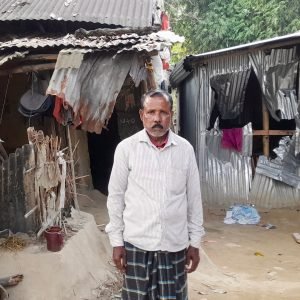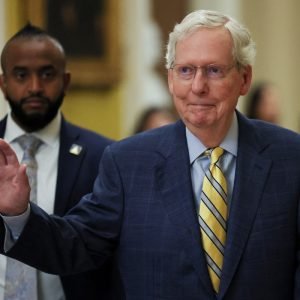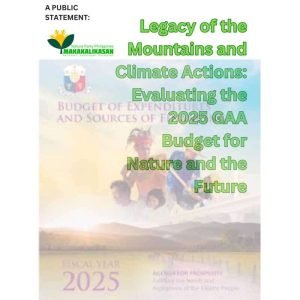
Key events
Detectives investigating four separate incidents of children being approached by drivers in white vans in Melbourne
Victoria police detectives are investigating four separate incidents in Melbourne in the last month of children being approached by drivers in white vans.
Police have said they believe the incidents are not linked.
On Tuesday morning, a 10-year-old boy walked away after he was approached by a man driving a white van on Landscape Dr in the eastern suburb of Boronia, police said.
Police said that, a day earlier, a 15-year-old girl was approached by a man driving a white van while she was walking along Saxon St in Doncaster, also in Melbourne’s east.
The man asked the girl to get in the van, police said, after which she ran away to a nearby shopping centre.
On the evening of 27 November, another teenage girl was approached by a man driving a white van on Spring St in Tullamarine, in the city’s north, police said.
Police said the man asked the 14-year-old to get inside the van and she ran away to a nearby park.
On 18 November, an 11-year-old boy was walking along Halley Street in Blackburn when he was approached by a man driving a white van, police said.
Police said the man told the boy his mother had asked him to give him a lift home and that he drove away after the child declined his offer.
The investigations into each of the incidents are ongoing, and police have asked anyone with any information to contact CrimeStoppers.
The Joe Rogan Experience again ranked the No 1 podcast in Australia
US podcaster Joe Rogan’s podcast is the most popular in the world on Spotify. And his podcast was the most popular among listeners in Australia and globally, the streaming company’s wrapped data shows.
This was the fifth year in a row the Joe Rogan Experience has been the world’s most streamed podcast on Spotify. But Rogan has been in the Australian headlines over the last couple of weeks for a different reason.
Late last month, the ABC chair Kim Williams sparked a furious response from Rogan fans for comments he made about the controversial podcaster at the National Press Club in Canberra.
At the press club, ABC reporter Jane Norman asked Williams about Rogan’s influence. Williams said he wasn’t a fan and that:
People like Mr Rogan prey on people’s vulnerabilities: they prey on fear, they prey on anxiety, they prey on all of the elements that contribute to uncertainty in society.
They entrepreneur fantasy outcomes and conspiracy outcomes as being a normal part of social narrative – I personally find it deeply repulsive.
At the time, Rogan responded on X: “LOL WUT.”
Elon Musk, the owner of X, said at the time: “From the head of Australian government-funded media, their Pravda.” (A reference to Soviet-state run media during communist rule)
Now for what the rest of us are listening to.
Spotify has released its Wrapped data for the year, which shows the most popular music, podcasts and audiobooks in Australia based on the number of streams.
Pop queen Taylor Swift has taken out the top spot as Australia’s most streamed artist for a second year in a row, off the back of her Eras tour.
Swift’s Tortured Poets Department was the most-streamed album in Australia. This was followed by Sabrina Carpenter’s Short n’Sweet and Billie Eilish’s Hit Me Hard and Soft.
American singer and songwriter Benson Boone has made his debut on the list and had the number one song with Beautiful Things, which he released early in the year.
The Wiggles were announced as Australia’s most-streamed local artists, followed by The Kid LAROI.
The 2013 indie rock classic Riptide by Australian singer Vance Joy is still going strong, taking out the number one place for Australia’s most-streamed local artist song.
It was followed by producer CYRIL’s Stumblin’ In, a rework of the classic song sung by Chris Norman and Suzi Quatro.
The prime minister, Anthony Albanese, has released what he says is his Spotify wrapped playlist for the year.
In a post on X, Albanese shared a screenshot of his most played songs on the streaming platform this year.
What he says were his top picks were all by Australian artists, with local bands Hockey Dad, Lime Cordiale and King Stingray in the mix.
His favourite song of the year was the indie rock ballad Australia by Melbourne musician G-Flip.
The prime minister’s second most played song was Letting Go by Angie McMahon, who is also from Melbourne (coincidentally, this blogger is looking forward to seeing Angie play at Meredith music festival this weekend).
Sarah Basford Canales
Labor’s Katy Gallagher to give speech defending public service
Labor frontbencher Katy Gallagher wears many hats but this morning, she will deliver a speech about the state of the public service – one of her portfolios – amid the Coalition’s proposed slash-and-burn of the bureaucracy.
The ACT senator and key lieutenant of prime minister Anthony Albanese will tell top mandarins this morning a battle over the Australian public service will be “front and centre” of the next federal election contest.
Gallagher’s annual speech on APS reform in Canberra on Thursday morning will depict the choice Labor says Australians, and particularly Canberrans where a large number of public servants work, will have at the polls: a well-resourced and capable public service with Labor or thousands of job cuts under a Dutton government.
The minister will say:
At a time when Australians are facing real cost of living pressures, these cuts would mean longer wait times for critical payments and reduced support for those who need it most.
It’s the same old, lazy playbook – cut jobs, outsource work and watch as policy capability collapses as Australians pay the price with a public service unable to deliver on their behalf.
The number of public servants has risen to more than 185,000 as of June, an 8.9% increase on the previous year, the latest state of the service report from the Australian Public Service Commission showed in November.
Since the Albanese government was elected in May 2022, the bureaucracy has grown by around 26,000 places, or 16.4%.
The opposition leader, Peter Dutton, has flagged potential job cuts in Canberra if he is victorious at the next federal election.
Gallagher is expected to tell the audience made up largely of bureaucrats she won’t go down “without a fight”.
“I’m not going to sit by and allow a lazy and fraudulent promise to cut the public service by 20% without a fight to present the alternative view. A strong, independent APS is worth fighting for.”
You can read more of our coverage here:
Chalmers concedes ‘possibility’ of Labor losing next election
Chalmers has said it is possible Labor will lose the next federal election after only one term in government.
During his interview with ABC’s RN Breakfast, the host, Patricia Karvelas, asked Chalmers if he conceded there was a “very real risk” Labor would not be re-elected. Chalmers replied:
Of course, that’s a possibility. You know, we take, we take no outcome of any election for granted.
Chalmers has also said he plans to hand down a fourth federal budget as treasurer in March, before the next election.
The treasurer said he would want Anthony Albanese to serve another full term as prime minister if Labor is re-elected, even if it doesn’t win enough seats to retain a majority government. Chalmers said:
One of the things that we’ve shown a capacity to do is regenerate under the same leader.
My expectation and my hope is, if we do win the election next year, that Anthony Albanese serves the full term and runs again, that’s what I would expect to happen.
Karvelas pressed Chalmers on this, asking him: “what’s wrong with change?” He responded:
Well, I think we’ve one of the things that we’ll be taking to the Australian people is a sense of stability, a sense that we’ve got an economic plan.
We’re rolling that out in difficult times, we’re helping people where we can, and that’s a tribute to Anthony’s leadership
Chalmers’ interview comes the day after an Australian National University study found just 38% of voters have confidence in the federal government, a level approaching the lows before Scott Morrison was voted out of office in May 2022.
Nevertheless, the study – based on a survey of 3,622 respondents between 15 and 25 October – found the prime minister, Anthony Albanese, had “significantly higher” favourability than Peter Dutton leading into the 2025 election.
Chalmers offers no comment on possibility of interest rate cut in December
Chalmers wouldn’t be drawn on whether Australia’s weak GDP growth means the Reserve Bank (RBA) will reduce interest rates when its board next meets on 10 December.
He said:
Well, I would say about that, that the Reserve Bank, when it meets, will weigh up all of this data, as they usually do.
They’ll come to a decision independently. They’ll do that with me, without me pre-empting [it].
The RBA’s latest forecasts had GDP expanding at an annual pace of 1.5% by the end of 2024 and the national accounts released yesterday suggest that estimate will have to be revised lower.
Over the twelve months to the September quarter this year, Australia’s headline inflation rate rose by 2.8%, which was the lowest in more than three years and within the RBA’s target range of 2-3%.
However, underlying inflation, which stripped out goods that were more volatile in price, remained at 3.5%.
At its November meeting, the RBA left the cash rate – which guides interest rates set by banks – unchanged for an eighth meeting in a row, at 4.35%.
Chalmers acknowledges economy ‘very weak’
The federal treasurer, Jim Chalmers, says he acknowledges the Australian economy is “very weak”.
Chalmers is being interviewed on ABC Radio National Breakfast the day after data was released showing the economy grew at a weaker-than-expected pace in the September quarter despite extra government spending.
He said:
I do acknowledge that the economy is very weak and people are under a lot of pressure.
And if you look at those quite difficult set of figures that were released yesterday, there were some encouraging elements.
When you look at the national accounts, you can see that wages are growing, inflation is coming down, and the tax cuts are playing a helpful and meaningful role as well.
Gross domestic product (GDP) expanded 0.3% in the July-September months, the fastest in a year and the 12th quarter in a row of growth, the Australian Bureau of Statistics national accounts figures released on Wednesday showed.
As my colleague Peter Hannam reported yesterday, gross domestic product (GDP) expanded 0.3% in the July-September months, compared with the 0.5% rate expected by economists – and the annual growth of 0.8% is the weakest since the end of 2020.
Greens election policy calls for federal drug testing agency

Natasha May
The Greens’s new election policy for a federal expansion of pill testing would involve the creation of a new drug testing agency.
The agency, housed within the federal Department of Health and Aged Care, would coordinate and run drug testing sites in capital cities and regional hubs as well as providing free testing services at Australian music festivals.
Under the policy, the Greens say they would also provide additional funding to the department to coordinate data collection, analysis and communication of results of the drug tests.
The drug testing sites would be rolled out over the next 5 years starting with 10 drug testing sites in capital cities in 2026-27, and later expanding to ultimately encompass 18 drug testing sites in capital cities and 4 in regional hubs from 2028-29 onwards.
The party’s spokesperson for health and mental health, Senator Jordon Steele-John, said:
At the moment the biggest danger facing young people using drugs at festivals isn’t the substance itself but a failure of government policy that doesn’t allow people to be able to check what is in that drug and access education and medical services when needed.
We have a system designed to criminalise and stigmatise people who take drugs in our community which has led to tragic outcomes. It is time we listen to the community and the experts and implement commonsense approaches to minimise harm and risk.
The Greens’ announcement comes as the NSW Labor government prepares for the second day of its two-day drug summit in Sydney, where it is canvassing potential reforms including pill testing.
The summit hasn’t finished, but the NSW government has already ruled out decriminalising the personal possession of drugs, leading to criticism from experts and health groups.
Welcome

Catie McLeod
Good morning and welcome to our live news blog. I’m Catie McLeod and I will be hosting the blog this morning. Here are our top overnight stories.
Australia is still far from catching up to the levels of migration expected before the pandemic, a new study from the Australian National University has shown, contrary to claims of record-high migration.
Before Covid, net migration was projected to hit about 300,000 by 2025. But the study, led by the migration hub’s director, Alan Gamlen, found net overseas migration may still be 82,000 people short of that number.
The New South Wales Greens’ environment spokesperson, Sue Higginson, has called on state Labor to step in and block Idemitsu’s plan to expand its Boggabri coal project, saying if the project is granted approval, it will result in an additional 62m tonnes of coal being dug up and burned in Australia and overseas.
Higginson says the federal Labor government is refusing to consider the effects on climate change from coal mining.
As we reported yesterday, the federal government has declined to review the Boggabri mine as well as BHP Mitsubishi’s Caval Ridge coal project in central Queensland and Jellinbah Group’s Lake Vermont coal project in Queensland for their potential climate impacts.
The decision means the three mines will remain under assessment for potential approval.
And the Greens have announced a new election policy for a federal expansion of pill testing, involving the creation of a new drug testing agency. I’ll have more on this announcement for you shortly.








